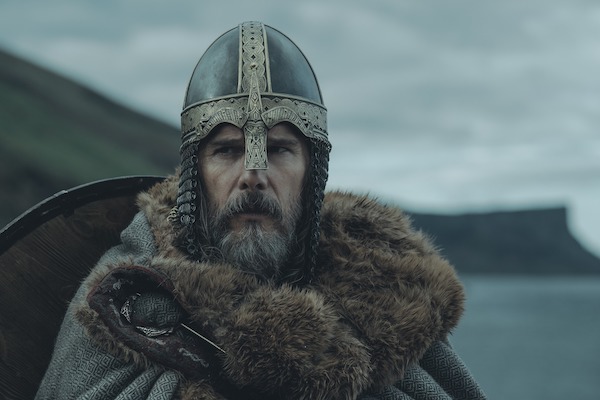Film Review: “The Northman” – A Violent Viking Saga Lights Up the Night
By Ed Symkus
The Northman is not going to make it onto my 2022 Top 10 list, but neither will it be relegated to the status of something I’m not interested in seeing again.
The Northman, directed by Robert Eggers. Opens at Coolidge Corner, Kendall Square, and Boston Common on April 22.

Ethan Hawke in The Northman.
With the release of The Northman, screenwriter, director, and New Hampshire native Robert Eggers has three feature films to his credit. Unlike some critics, I never fell under the spell of his first two. In fact, I had trouble watching his first, The Witch, a bleak, grim, and unsettling study (circa New England, 1630) in Puritanical despair. Nor can I endorse his incomprehensible follow-up, The Lighthouse, a terrifically acted but murky two-hander that focuses on two males who go bonkers in forced isolation. Still, I understand why both films earned raves for the striking work of cinematographer Jarin Blaschke.
Now we have The Northman, an action film blessed with a bigger budget, a more expansive visual palette (yes, the gifted Blaschke is again onboard), an accessible but intriguing story line (revenge is the name of the game) that is populated by fleshed-out characters. And then there is the most valuable asset a filmmaker can have — added experience.
That’s not to say that The Northman is going to make it onto my 2022 Top 10 list, but neither will it be relegated to the status of something I’m not interested in seeing again.
Set in the year 895 somewhere in the North Atlantic, the film is about seeking vengeance for foul murder. Its plot mechanics resemble Hamlet. Blaring horns and pounding drums herald the return home from battle of King Aurvandil War-Raven (Ethan Hawke) after a season away. His subjects rejoice, as does his young son Amleth (Oscar Novak). But what, one wonders, does that fleeting, enigmatic look on the face of Queen Gudrún (Nicole Kidman) signify? And what of the seeming indifference emanating from the king’s short-tempered brother, Fjölnir (Claes Bang)?
Some of those hints of malfeasance are made clear soon in this cold, gray, snowy castle. But a good deal of them aren’t explained until much later. There’s no doubt that the king and his son adore each other, and that the king wants Amleth to know what’s in store for him as a future leader, including how to live and die with honor. But their scenes together are few. Fjölnir soon reveals his malevolent ambitions: he slaughters the king, throws the screaming queen over his shoulder, and runs away, all in view of the convincingly distraught Amleth.
Many years later … Amleth (now played by Alexander Skarsgård) has become a warrior, a member of a band of brutal shirtless savages who do bloody pillaging with knives, axes, and, on occasion, their teeth. Yet Amleth’s also a loner, spending a lot of time brooding silently. He has been obsessed with payback for decades. His vows include, “I will save you, mother; I will avenge you, father.”
And so the story goes, juiced up with hazy mysticism, some supernatural elements, bizarre imagery, and foreboding landscapes. Prophecies are proclaimed, identities are disguised, deception is practiced, additional characters are introduced — the most important being a slave named Olga (Anya Taylor-Joy) and Fjölnir’s son Thórir (Gustav Lindh). And revelations about what really occurred all those years ago finally see the light.
Given a mood and atmosphere driven by a motif of nighttime scenes lit only by roaring fires (Blaschke no doubt taking a cue from John Alcott’s work with candlelight in Barry Lyndon), the film ventures into some unexpected emotional places and depths. Amleth, joining up with Olga, calls for — and is granted — the seething fury of chaos. There’s also plentiful violence, though most — but not all — of it occurs in the shadows or slightly off-camera. Amleth’s desire for revenge is omnipresent (no Hamlet he); it’s obvious that The Northman has no alternative but to culminate in a raging confrontation. And the climax does not disappoint — Eggers even offers up a denouement that can only be described as peaceful.
Ed Symkus is a Boston native and Emerson College graduate. He went to Woodstock, is a fan of Harry Crews, Sax Rohmer, and John Wyndham, and has visited the Outer Hebrides, the Lofoten Islands, Anglesey, Mykonos, the Azores, Catalina, Kangaroo Island, and the Isle of Capri with his wife Lisa.


The movie shows us in the way of mythology what ancient human life was like in a certain place, full of blood, gore, and traditions that are stomach-turning today. Visually spectacular. The ending–primitive naked men fighting to the death–leaves viewers with an disturbing feeling of likeness to today.